Is All Vegan and Vegetarian Food Halal?
The short answer is not always. Despite what you may think, vegan and vegetarian food is not necessarily halal. You may be surprised here, let’s explore to find out more.
What is Halal?
Halal is the Arabic word for “allowed” or “lawful”.” The Muslim term “halal” refers to anything that is permissible for Muslims.
Most foods and beverages are considered halal, unless explicitly prohibited by an authentic Hadith or a specific Qur’anic verse.
Haram is the opposite of halal meaning forbidden and unlawful. Foods that are haram are forbidden for Muslims.
Below is a list of haram foods.
“Everything is halal except ABCD IS haram” is a useful heuristic.
A-Alcohol (ethyl) and drugs
B– Blood – flowing or congealed blood for ex. French Boudin Noir (blood sausage)
C– Carnivorous animals for ex. Bears, lions
D– Dead meat – meat that is not slaughtered in accordance with Islamic slaughtering rites
I– Food that is sacrificed to idols
S– Swine and all swine derivatives for ex. pigs, hogs
Note: Fish and other marine animals are halal and do not require halal slaughter.
Vegetarian vs Vegan: What is the Difference?
Due to health concerns, religious reasons, the environment, and animal welfare, many people are switching to plant based vegetarian and vegan diets.
Even though vegetarian and vegan sound similar. There are distinctions between these two diets.
Vegetarian
A vegetarian eats plants and typically cuts out animal meat from their diets, but in general still consumes eggs and dairy like cheese.
You can read more about vegetarians and the seven different types here.

Vegan
Similarly, a vegan also doesn’t eat animal meat, but their diet is stricter and extends to not consuming animal-derived products like eggs, dairy and honey.
For many vegans, being vegan goes beyond what they eat and is an actual lifestyle. To read more about vegans and the 6 different types click here.
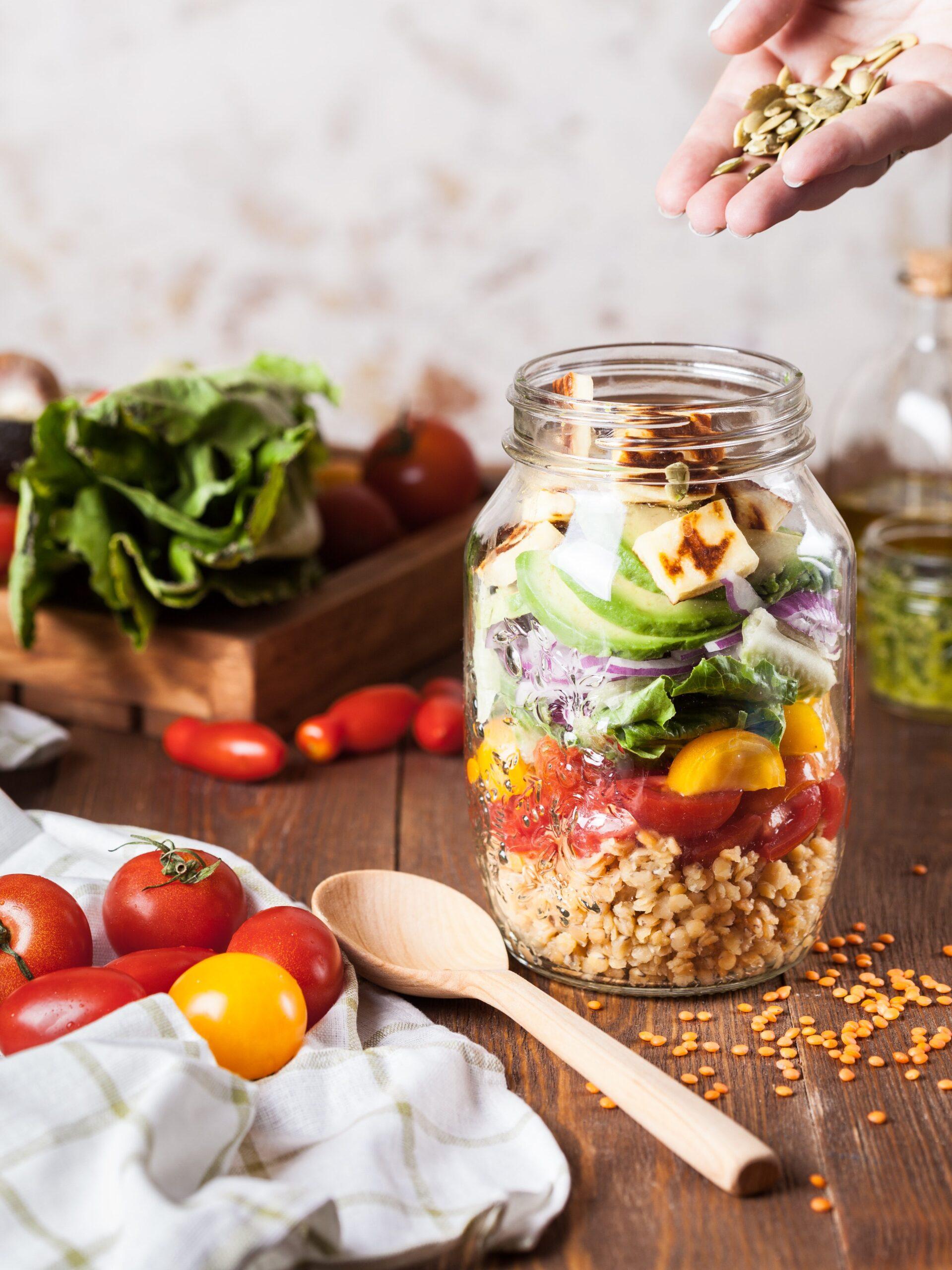
Generally, for both vegetarians and vegan diets meat, poultry, seafood, fish, and products like animal- derived gelatine, pork, lard, animal rennet (RIHN-niht) found in some cheeses, and animal shortening are forbidden and are not halal.
Potentially Haram Vegan and Vegetarian Foods:
- Alcoholic Beverages
Alcohol made without cream and honey, is considered vegan, but it is not Halal.
Vegan dishes like cakes, desserts, sweets, soup and even risotto can be made with alcoholic drinks.
Red wine, whiskey, rum, beer, liquor, sake, and other alcoholic beverages come in a variety of flavors and names and are used as flavor enhancers in some vegan and vegetarian dishes.
Does Vegan Food Contain Alcohol?
Yes, its possible for vegan food to contain alcohol. Not all vegan food is halal.
The following are some examples of vegan and vegetarian foods that may contain alcohol:
Fish and Chips : Beer batter may be used in the fish. Do make sure to check.
Boeuf Bourguignon : French beef stew with red wine.
Tiramisu : Can contain Marsala, a wine traditionally used in this dessert.
Truffles : Chocolate truffles infused with Rum
- Soy Sauce
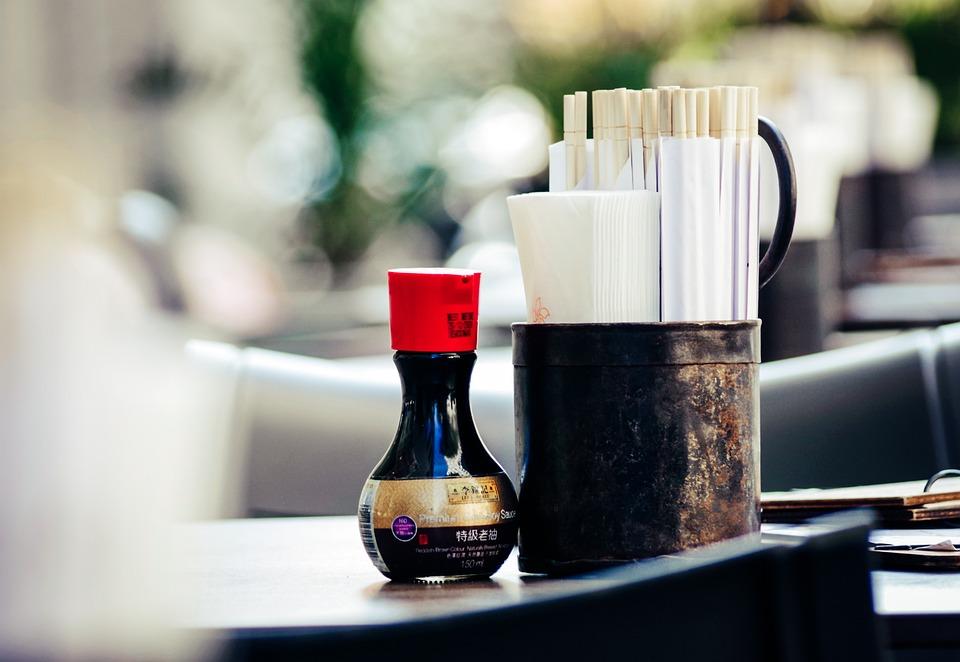
Due to the fermentation process soy sauce contains 1-3% alcohol after being brewed and fermented.
Even though it contains residual alcohol from the fermentation stage, certain scholars like Darul Iftaa Birmingham, state it is halal because it will not intoxicate and does not resemble wine by any means.
Whereas some Muslims argue that this amount is insufficient to cause intoxication, making soy sauce Halal, other Muslims claim that soy sauce is haram as the alcohol used to produce it comes from raisins, grapes, or dates.
In their view, regardless of fermentation it still contains a percentage of alcohol making it haram.
It’s important to do your own research and see which Islamic interpretation you follow.
Alternatively, if you want to stay on the safe side, there is All Purpose Soy Sauce which is non-naturally brewed soy sauce, making it Halal.
It is made from corn syrup, sodium benzoate, water, salt, hydrolysed soy protein, and salt.
All purpose soy sauce is lighter than regular soy sauce and can be used to add flavour to a dish without overpowering it with a strong soy flavour or giving it a dark colour.
- Vanilla Extract

Vanilla is commonly used in desserts and drinks and is available in a variety of forms (essence, extract, powder, etc.). Ethyl alcohol is commonly present in vanilla extracts in amounts of 0.1% or less, and such a little amount is unlikely to result in intoxication.
Opinions diverge on whether or not vanilla extract is halal. Regardless of the amount of alcohol present, some Muslim scholars say that vanilla extract is haram and must be avoided.
However, according to the Islamic Food and Nutrition Council of America (IFANCA): Products made with vanilla extract that don’t come from alcoholic beverages (such as beer, wine, or hard liquor) and have an ethyl alcohol content of less than 0.1% are considered halal and are therefore acceptable for consumption.
Other Muslims scholars and Halal certifiers accept that vanilla extract is halal so long as the alcohol used in its production does not come from grapes, raisins, or dates.
According to widespread agreement, vanilla extract is halal and acceptable if the level of alcohol is low enough not to cause intoxication. Again, this is up to your interpretation and understanding.
Note: not all vanilla extracts are created equally. Use real vanilla pods or alcohol-free vanilla extract if you want to stay on the safe side.

Is Vegan and Vegetarian Food Halal?
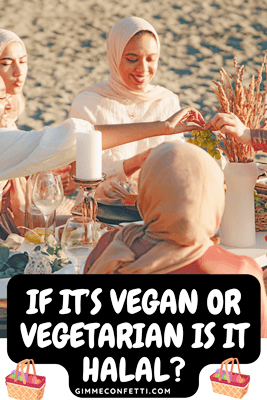
So is vegan and vegetarian halal? In a nutshell, not really. In most cases, vegan and vegetarian food is halal, but not always.
Even though vegan food does not contain any ingredients that are derived from animals and are considered haram, it may still contain other types of haram ingredients, most commonly alcohol and ingredients that contain alcohol.
As long as it isn’t cooked or prepared with alcohol, vegetarian and vegan food can be considered Halal.
Reverse the Question: Is Halal Food Vegan and Vegetarian?
Despite what you may think, halal food is not necessarily vegan or vegetarian. Many halal dishes are not vegan or vegetarian. Although, Islamic law permits a wide variety of meats, a vegan and vegetarian diet does not include any meat (or animal derived products for vegans).
For example, halal chicken and meat is halal, but it is not vegan or vegetarian, as vegans and vegetarians in turn do not consume meat. Dairy and eggs are also halal; however, they are not vegan.

Grab Your ESSENTIAL Free French TravelPhrasebook + Vegan Phrases + Cheeky Bonus Slang
Includes Phrases You NEED to Know + Vegan Essentials in France + BONUS Cheeky French Slang Only Locals Know
FAQ
Is Vegan Pork Halal?
Wondering does halal pork exist? Well, pork from the animal is haram and not permissible to eat for Muslims. However this is not completely the case for vegan pork.
As long as the vegan pork is prepared without haram ingredients, it can be consumed.
Mufti Ibrahim Desai says that a food’s permissibility is not determined by its name but rather by its ingredients.
The component of a dish, not its name, determines its permissibility.
Therefore, vegetarian pork is still permissible if it is completely free of any non-dhabīhah animal-derived product, even though the product’s name might be alarming because it includes the word “pork.”
Are Vegan Meat and Vegan Burgers Halal?
Vegan products are becoming more and more accessible as vegan diets gain popularity.
There are some vegan meats on the market, which are also known as meat-replacement or meat substitutes.
Plant-based “meat” is made from things like, soy, jackfruit, legumes, nuts and so on. The components are processed to produce a finished product that resembles meat in appearance and flavour.
Vegan meats typically comply with halal requirements because they contain halal ingredients like pea protein, rice protein, and coconut oil among others.
To be safe though, do make sure you read the list of ingredients to check it doesn’t contain whey, eggs, or alcohol.
All plants are halal, so vegan meat and vegan burgers are halal if they are made from halal plants which are not harmful or intoxicating. Many Islamic scholars agree that this is the case.
Is Beyond Meat Halal?
Yes, according to the ISA (Islamic Services of America) Beyond Meat products are halal.
Beyond Meat is plant-based with no animal-based additives, and no cross-contamination with animal by-products during processing, distribution, and storage.
The Beyond Meat facilities, processes and product ingredients have been reviewed, approved and certified for Halal compliance under ISA and in accordance with Islamic Law and International Assessment Standards.
Islamic services of america
This means:
Beyond Burger® is halal
Beyond Beef® is halal
Beyond Beef® Crumbles is halal
Beyond Meatballs™ are halal
Beyond Sausage® is halal
Beyond Breakfast Sausage® Patties are halal
Beyond Breakfast Sausage® Links are halal
Beyond Sausage® Crumbles are halal
Are Vegan Sausages Halal?
A vegan sausage composed of plants that are non-intoxicating is halal. Therefore, when made with halal ingredients, vegan sausages are also halal, following the same logic as the vegan meat and burger mentioned above.
Again, do make sure you read and check all the other ingredients to see it doesn’t include any prohibited ingredients.
Are Vegan Sweets Halal?
Initially, you could assume that all vegan sweets are halal because they don’t contain pork and don’t use animal derived- gelatine. Vegan sweets, however, can include ingredients that are not halal.
These include:
- Alcohol is prohibited in Islam as it is considered an intoxicant.
- Vegan sweets might have alcohol added to them or flavourings made with alcohol (like vanilla extract), which some scholars consider haram.
Many industrial products, including vegan sweets, have ingredients added to improve their flavour and aroma where ethanol or alcohol serves as a primary carrier for the majority of flavours.
As a result, vegan sweets cannot be considered “halal” if the flavour has been dissolved in alcohol (ethanol).
- Cross-contamination: Vegan sweets may contain traces of haram products, such as pork, if they are produced in industrial facilities that also produce non-halal products.
This is not to say that all vegan sweets are haram. Just make sure you do your homework and investigate the ingredients that are listed.
Takeaway
Vegan and vegetarian food is usually Halal, as it does not contain any animal meat and no ingredients derived from animals (for vegans). However, do make sure it does not contain alcohol.
In addition, vegan meat and other products are halal (such as vegan meat and vegan sweets), when only halal ingredients are used in their preparation and no cross- contamination has taken place with other haram ingredients.
It is incorrect to assume that all halal food is vegan and vegetarian. A vegan diet does not include any meat or products derived from animals, even though Islamic law allows for a wide variety of halal meats.
Although they are not vegan, dairy and eggs are considered halal. As a result, not all halal food is vegan.
Want To Make Vegan Halal Food?
Don’t miss these vegan halal recipes! Check out these recipes for inspiration for your next meal:
Vegan Baith Tomat (Arab Tofu Scramble with Tomatoes) from Kuwait
Seriously the Best Vegan Whole Roasted Cauliflower
Found this guide about halal vegan and vegetarian food helpful? Pin it now and read it again later:
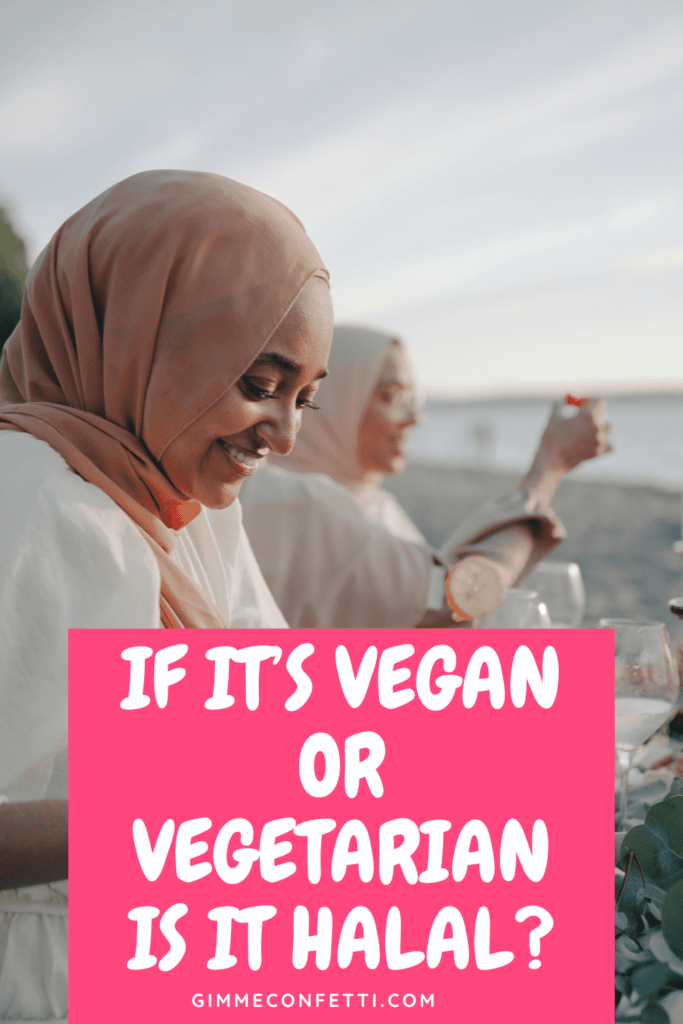

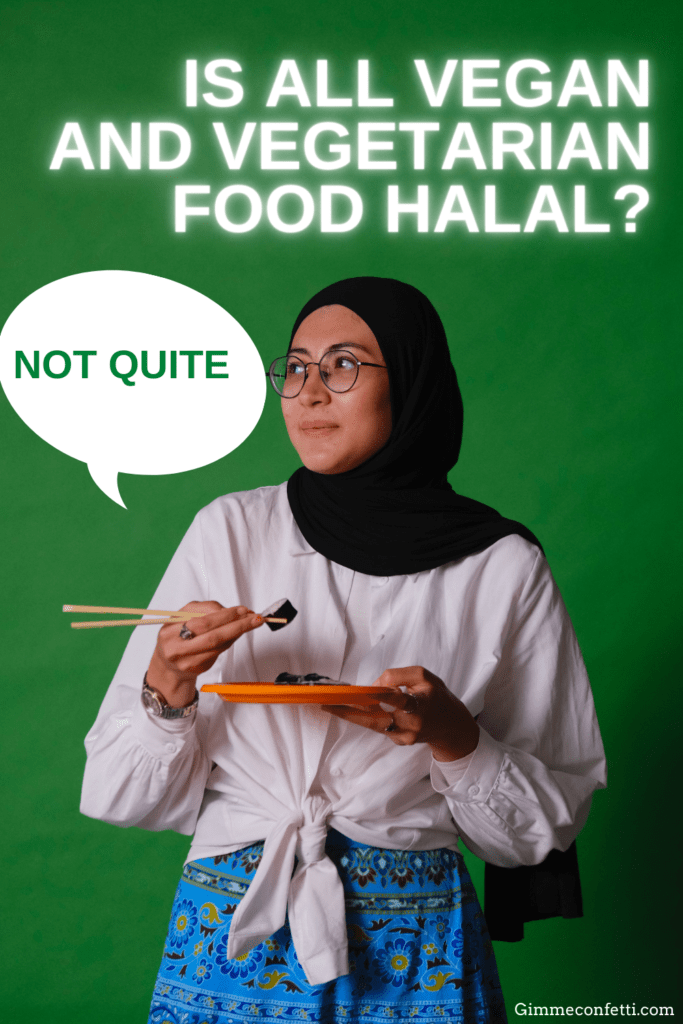
Save or Share!

